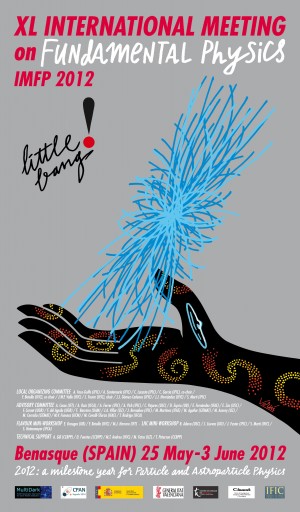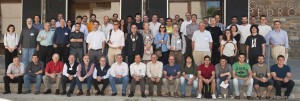Spain held the 40th edition of the International Meeting on Fundamental Physics (IMFP 2012) in the Spanish Pyrenees from 24 May to 3 June. 140 researchers coming from international and Spanish research institutions gathered at the Centro de Ciencias de Benasque Pedro Pascual in Benasque. The centre owes its name to Pedro Pascual, a distinguished theoretical physicist who was instrumental in the development of science in Spain, in particular fundamental research, in the last decades of the past century.
The International Meeting on Fundamental Physics (IMFP) was launched in 1973 as the result of an initiative of Manuel Aguilar (JEN-CIEMAT), Lucien Montanet (CERN), Juan Antonio Rubio (JEN-CIEMAT) and Francisco Ynduráin (Universidad Autónoma de Madrid), funded by the Institute of Nuclear Studies of Spain’s Junta de Energía Nuclear (JEN), with strong support from CERN. One of the main initial goals of IMFP war setting up a forum in which prestigious researchers, mostly coming from abroad, would present the most relevant scientific advances in experimental high-energy physics to the young and very reduced community of Spanish physicists working in the discipline.
Spain had withdrawn from CERN in 1969, and IMFP was founded to bring it back into the heart of the European research community. It was also supposed to foster collaboration between particle physicists and explore possible mechanisms for the development and consolidation of particle physics in Spain, for example through the participation in research programmes at other large international laboratories. At one of the earliest IMFP meetings, discussions took place to identify the most effective ways to facilitate the return of Spain to CERN, which finally happened in 1983. Forty years later the community recognises that IMFP has largely fulfilled its initial goals, becoming a reference at the national level and an international event that is widely appreciated.
The latest edition at the Centro Pedro Pascual, in the beautiful site of Benasque, included a workshop on flavour physics and on the relevance and opportunity of super B factories, in the construction phase or under discussion, sessions on neutrino physics, physics at the Canfranc Underground Laboratory, cosmic rays and ultra-high-energy gamma rays, dark matter and dark energy, gravitational waves, physics at the hadron colliders Tevatron at Fermilab and LHC at CERN. The future of the LHC and its ambitious experimental programme and the scientific perspectives of the electron−positron colliders under consideration (ILC and CLIC) were the subject of long scientific sessions of remarkable interest. The last part of the meeting was devoted to present the plans to design a European Strategy for Particle Physics and to make an assessment of the situation in Spain and the possible contributions from our community. Participants concluded that the situation in Spain is excellent from the scientific point of view and fairly worrisome in what concerns the evolution of resources.
This meeting was organised by IFIC (Institute of Corpuscular Physics, a Joint Center CSIC−University of Valencia), under the leadership of Francisco Botella, Juan Fuster and Carmen García, and was funded by CPAN, the National Program for Particle Physics, IFIC, CIEMAT, the Consolider project Multidark and the Centro Pedro Pascual.
Then, from 11 to 15 June, the University of Cantabria (UC) and the International University Menéndez y Pelayo, extended an invitation to international experts to participate in the unique international encounter called Cantabria Campus Nobel. The Cantabria Campus Nobel aimed at pushing the boundaries of knowledge on the basis of collective thinking, rigorous analysis and the exchange of innovative experiences.
Intergenerational dialogue was designed to be the essence of the venue, with three Nobel Laureates, 50 senior world-class scientists and 100 bright young researchers, selected from all possible areas of knowledge. Debates, one-to-one interactions and close conversations were coupled with master classes and lectures, workshops and round table sessions.
The afternoon and evening of 11 June was dedicated to high-energy physics with a Round table on High Energy Physics called “The LHC and future linear colliders analysis (Higgs mechanism and new physics searches)”. It was hosted and coordinated by Alberto Ruiz Jimeno from the University of Cantabria. He is also EB member of the ILD concept for ILC and gave a speech about High Energy Physics concepts and goals. The Participants in the round-table were Sven Heinemeyer of the Cantabria Institute of Physics (IFCA), Francisco Matorras Weinig of the University of Cantabria, and François Richard, who spoke about the worldwide strategy for future linear colliders, its goals and challenges.



Recent Comments